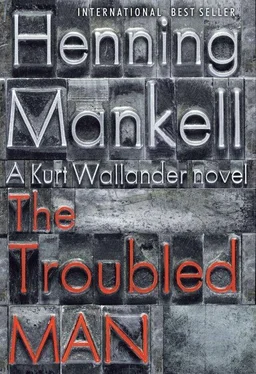It was Eskil Lundberg who found the dead bodies. Ytterberg had immediately called in the CID in Norrköping to assist. Since it was a matter for the security police and the military intelligence service, an embargo had been immediately imposed on all aspects of the investigation, and everything was shrouded in secrecy. Wallander was informed by Ytterberg of whatever he was allowed to pass on, in strict confidence. The whole time, Wallander worried about the possibility of his own presence at the scene being discovered. What concerned him most was whether Nordlander had told his wife about the trip he was going to make, but evidently he hadn’t. With great reluctance Wallander read in the newspapers about Mrs. Nordlander’s despair over her husband’s death and her refusal to believe that he had killed his old friend and then shot himself.
Ytterberg occasionally complained to Wallander about the fact that not even he, the man in charge of the police investigation, knew what was going on behind the scenes. But there was no doubt that Sten Nordlander had killed Håkan von Enke using two shots to the head, and had then shot himself. What was mysterious and what nobody could explain was how Sten Nordlander had come to Blue Island. Ytterberg said on several occasions that he suspected a third party had been involved, but who that could have been and what role he or she played he had no idea. The real motive for the tragedy was also something that nobody could work out.
The newspapers and other media were full of speculation. They wallowed in the bloody drama played out in the hunting lodge. Linda and Hans and Klara had almost been forced to move in order to avoid all the inquisitive journalists and their intrusive questions. The wildest of the conspiracy theorists maintained that Håkan von Enke and Sten Nordlander had taken to their graves a secret linked to the death of Olof Palme.
Occasionally during his conversations with Ytterberg, Wallander had asked cautiously, almost out of politeness, how things were going with regard to the suspicions that Louise von Enke could have been a Russian spy. Ytterberg had only extremely meager information to give him.
“I have the impression that everything is at a standstill as far as she is concerned,” he said. “What facts the security police are looking for, or trying to suppress, I have no idea. We might have to wait until some investigative journalist goes to town on that.”
Wallander never heard a word about the possibility of Håkan von Enke’s being a spy for the U.S.A. There were no suspicions, no rumors, no speculations that this might be the cause of what had happened. Wallander once asked Ytterberg point-blank if there were any such theories. Ytterberg had been totally incredulous.
“Why in God’s name should he have been a U.S. spy?”
“I’m just trying to think of any possible explanation for what happened,” Wallander said. “Given there have been suspicions that Louise was spying for the Russians, why not try a different possibility?”
“I think I’d have heard if the security police or military intelligence had any suspicions of that sort.”
“I was only thinking aloud,” said Wallander.
“Do you know something I don’t?” Ytterberg suddenly asked with an unexpected edge to his voice.
“No,” said Wallander. “I don’t know anything you don’t.”
It was after that conversation that Wallander began writing. He collected all his thoughts, all his notes, and invented a system of Post-its that he stuck up on one of the living room walls. But every time Linda came to visit him, with or without Hans and Klara, he took them down. He wanted to write his story without the involvement of anybody else, and without anyone’s even suspecting what he was doing.
He began by trying to tie up the remaining loose ends. It wasn’t difficult to check that “USG Enterprises,” whose name he had seen in the entrance hall of the building where George Talboth lived, was the name of a consultancy firm. There was no indication that it wasn’t aboveboard. But he couldn’t work out who had broken into his house while he was away, nor who could have visited Niklasgården. It was obvious that they were people who had assisted Håkan von Enke in some way, but Wallander never established why they did it. Even if the most likely explanation was that they were looking for what Wallander called Signe’s book. It was lying on the kitchen table as he wrote, but otherwise he continued to hide it in Jussi’s kennel.
It wasn’t long before it dawned on him what he was really doing. He was writing about himself and his own life just as much as about Håkan von Enke. When he returned in his thoughts to everything he had heard about the Cold War, the divided attitude of the Swedish armed forces to neutrality and not joining alliances or the necessity of being an integrated part of NATO, he realized how little he actually knew about the world he had lived in. It was impossible to catch up on the knowledge he hadn’t bothered to acquire earlier. What he could learn now about that world obviously had to be from the perspective of somebody in the present looking back in time. He wondered grimly if that might be typical of his generation. An unwillingness to care about the real world they lived in, the political circumstances that were shifting all the time. Or had his generation been split? Between those who cared, and those who didn’t?
His father had often been better informed than Wallander on all kinds of events, he could see that now. It wasn’t only the episode with Tage Erlander and his speech in the People’s Park in Malmö. He also recalled a time in the early 1970s when his father had told him off for not bothering to vote in the election that had taken place a few days earlier. Wallander could still remember his father’s fury, how he had called him “an idle idiot when it comes to politics” before throwing a paintbrush at him and telling him to get out of his sight. Which he had done, of course. At the time he just thought his father was weird. Why should Wallander care about the way Swedish politicians were always arguing with one another? The only things that were of any interest to him were lower taxes and higher wages, nothing else.
He often sat at his kitchen table and wondered if his closest friends thought the same way. Not interested in politics, only worried about their own circumstances. On the few occasions he ever talked about politics it was mainly a matter of attacking individual politicians, complaining about their idiotic shenanigans without moving on to the next stage and wondering what the alternatives were.
There had been only one short period when he thought seriously about the political situation in Sweden, Europe, and perhaps even the world. That was nearly twenty years ago, in connection with the brutal double murder of an elderly farming couple in Lenarp. Fingers were pointed at illegal immigrants or asylum-seekers, and Wallander had been forced to face up to his own opinions on the massive immigration into Sweden. He realized that behind his usual peaceful and tolerant exterior lurked dark, even racist, views. The realization had surprised and scared him. He had eliminated all such thoughts. But after that investigation, which had come to its remarkable conclusion in the market square at Kivik, where the two murderers had been arrested, he sank back into his political apathy.
He visited the Ystad library several times during the fall and borrowed books about Swedish postwar history. He read about all the discussions concerning whether or not Sweden should acquire nuclear weapons or join NATO. Despite the fact that he was reaching adulthood when some of these debates were taking place, he had no recollection of reacting to what the politicians were talking about. It was as if he had been living in a glass bubble.
Читать дальше












